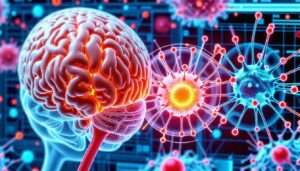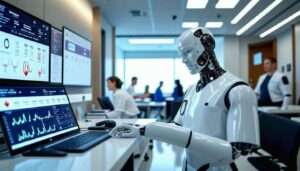Delve into the world of pharmaceuticals and discover how artificial intelligence (AI) is revolutionizing the process of drug discovery and development. As you navigate through this informative post, you’ll uncover how AI is accelerating the identification of potential drug candidates, optimizing clinical trials, and reducing the time and cost associated with bringing new medications to market. Additionally, you’ll learn about the potential dangers and ethical considerations surrounding the use of AI in drug development, and how the integration of this technology is shaping the future of healthcare. Whether you’re a researcher, healthcare professional, or simply curious about the intersection of AI and medicine, this post will provide you with valuable insights into the transformative impact of AI in drug discovery and development.
Key Takeaways:
- Accelerated drug discovery: AI algorithms can analyze vast amounts of data and predict potential drug candidates, significantly speeding up the drug discovery process.
- Precision medicine: AI can help identify subpopulations that may benefit from specific drug therapies, leading to more personalized and effective treatments.
- Reduced costs: By streamlining the drug development process and minimizing the risk of failed clinical trials, AI can help reduce the overall costs associated with bringing new drugs to market.
- Improved target identification: AI technologies can assist in the identification of novel drug targets by analyzing complex biological data and identifying potential disease mechanisms.
- Enhanced safety and efficacy: AI can aid in predicting the safety and efficacy of drug candidates, ultimately leading to the development of safer and more effective drugs.
AI-Driven Drug Discovery Techniques
Obviously, the use of artificial intelligence (AI) has significantly transformed drug discovery and development processes. AI has brought about a revolution in the pharmaceutical industry, allowing for the rapid and cost-effective identification of potential drug candidates. In this chapter, we will delve deeper into the various AI-driven drug discovery techniques that are shaping the future of pharmaceutical research and development.
Machine Learning and Predictive Analysis
Machine learning has emerged as a powerful tool in drug discovery, enabling researchers to analyze large datasets and predict the potential efficacy and safety of new drug candidates. By leveraging algorithms and statistical models, machine learning algorithms can identify complex patterns in biological and chemical data. This allows for the more efficient selection of drug targets and the prediction of a drug candidate’s behavior within the human body. Through predictive analysis, machine learning enables you to rapidly screen and prioritize potential drug compounds, ultimately accelerating the drug development process and reducing the associated costs.
Structure-Based Drug Design (SBDD) and AI
Structure-based drug design, combined with AI technologies, has revolutionized the process of discovering new drugs. AI can analyze and predict the interactions between potential drug compounds and their target proteins at the molecular level. This enables you to design highly specific and effective drugs with minimal off-target effects. By leveraging AI in SBDD, you can significantly expedite the identification and optimization of drug candidates, ultimately minimizing the time and resources required for drug development. The integration of AI in SBDD empowers you to design drugs more precisely, enhancing their efficacy while minimizing potential risks and side effects.
By harnessing the power of machine learning and predictive analysis, as well as leveraging AI in SBDD, you can significantly accelerate the drug discovery and development process while also ensuring the development of safer and more effective pharmaceutical products. AI-driven techniques are shaping the future of drug discovery, empowering you to make groundbreaking advancements in the field of medicine. It is important to note that while AI presents tremendous opportunities, the ethical and regulatory implications of AI-driven drug discovery should be carefully considered to ensure the responsible and safe development of new pharmaceutical products.
Accelerating Development with AI
Some of the most impactful advancements in drug discovery and development have been made possible through the application of Artificial Intelligence (AI). AI has played a critical role in expediting the development process, helping researchers and pharmaceutical companies to streamline various stages of drug discovery and development. You can read more about the role of AI in drug discovery and healthcare here.
Enhancing Target Identification
One way AI accelerates drug development is by enhancing target identification. AI models can analyze massive amounts of biological, chemical, and clinical data to identify potential drug targets with a high level of precision. By leveraging AI, you can significantly reduce the time and resources traditionally required for this crucial stage, allowing for a more efficient and targeted approach to developing new therapies. AI also enables you to identify potential side effects and risks associated with specific drug targets, making the process safer and more reliable.
Streamlining Preclinical Trials
Another significant impact of AI in drug development is the streamlining of preclinical trials. AI algorithms can sift through extensive data sets to identify potential candidates for preclinical trials, predict their potential efficacy, and even optimize dosing regimens. By leveraging AI for preclinical trials, you can accelerate the process of selecting the most promising drug candidates for further development, ultimately saving you time and resources. This allows you to focus your efforts on the most viable and impactful compounds, enhancing the overall efficiency and effectiveness of your drug development process.
Challenges and Considerations
Your journey in utilizing AI for drug discovery and development comes with a set of challenges and considerations that must be carefully navigated in order to achieve success. From ethical and regulatory hurdles to data quality and integration issues, there are various factors to consider as you harness the power of AI in this critical field.
Ethical and Regulatory Hurdles
As you embark on the use of AI in drug discovery and development, it is crucial to carefully consider the ethical and regulatory hurdles that come with this advanced technology. Ensuring patient safety and privacy is of utmost importance, and navigating the complex landscape of ethical considerations can be challenging. Moreover, the regulatory framework surrounding AI in healthcare is still evolving, requiring you to stay up-to-date with the latest guidelines and compliance requirements to avoid potential legal pitfalls.
Data Quality and Integration Issues
Another critical consideration in your journey is the quality and integration of data that will be used in conjunction with AI algorithms. Ensuring the accuracy and reliability of the data sources is paramount, as any shortcomings in data quality can significantly impact the efficacy and safety of the drugs developed. Additionally, integrating data from diverse sources, such as clinical trials, molecular data, and real-world evidence, presents a formidable challenge that must be addressed to maximize the potential of AI in drug discovery and development.
Case Studies and Success Stories
Keep in mind, AI has already shown tremendous success in drug discovery and development. Here are some case studies highlighting the impact of AI in the pharmaceutical industry:
- Atomwise: Utilizing AI technology, Atomwise was able to identify a promising drug candidate for the Ebola virus in just a matter of days, a process that typically takes months or even years using traditional methods.
- BERG Health: The company used AI to identify a potential biomarker for pancreatic cancer, leading to the discovery of a drug that demonstrated a 30% increase in overall survival for patients.
- Insilico Medicine: By harnessing the power of AI, Insilico Medicine developed a drug candidate for idiopathic pulmonary fibrosis in just 18 months, a process that typically takes 5-10 years using conventional methods.
For more information on how AI could revolutionize drug discovery, you can read the McKinsey article How AI could revolutionize drug discovery.
Notable AI-Driven Drugs in the Market
Several AI-driven drugs have made their way to the market, showcasing the potential of AI in drug development. From personalized medicine to targeted therapies, these drugs have proven innovative in their approach, offering new hope for patients.
Future Prospects and Upcoming Innovations
As AI continues to advance, the future of drug discovery and development looks incredibly promising. With the ability to analyze vast amounts of data and identify potential drug candidates with greater efficiency, AI is poised to revolutionize the pharmaceutical industry in the coming years, bringing about groundbreaking innovations and improvements in patient care.
Conclusion
Presently, the impact of AI in drug discovery and development is undeniable. Through the utilization of machine learning, AI has revolutionized the way pharmaceuticals are researched, tested, and developed, leading to faster and more efficient processes. As you continue to explore the advancements in drug development, it is essential to stay informed about the potential of AI and its implications in shaping the future of the pharmaceutical industry. To learn more about the role of AI in drug development, you can visit Revolutionizing Drug Development Through Artificial Intelligence and Machine Learning.
FAQ
Q: What is the impact of AI in drug discovery and development?
A: AI has revolutionized drug discovery and development by accelerating the identification of potential drug candidates, reducing time and costs, and improving success rates in clinical trials.
Q: How does AI assist in drug discovery and development?
A: AI assists by analyzing vast amounts of biological and chemical data to identify patterns, predict molecular behavior, and design novel drug compounds with specific therapeutic properties.
Q: What are the challenges of implementing AI in drug discovery and development?
A: Challenges include data quality and privacy concerns, regulatory approval, integration with existing research processes, and the need for interdisciplinary expertise in both AI and pharmaceutical development.
Q: What are some examples of AI applications in drug discovery and development?
A: Examples include virtual screening of compound libraries, predictive modeling of drug-target interactions, de novo drug design, precision medicine approaches, and repurposing of existing drugs for new indications.
Q: What is the future of AI in drug discovery and development?
A: The future holds promise for AI to enable personalized medicine, facilitate the discovery of new drug targets, optimize clinical trial design, and further accelerate the drug development process, ultimately leading to the delivery of safer and more effective therapies for patients.




